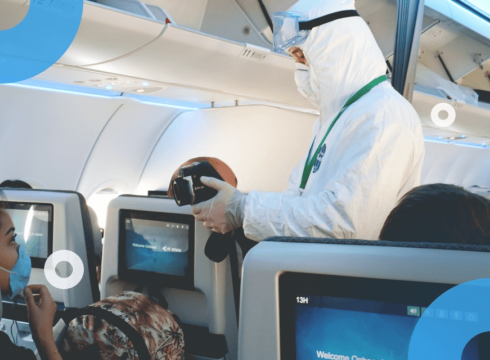From Airlines to
E-Commerce Platforms: The Unstoppable Digital Shift

There’s no doubt that we’re In an era characterised by rapid digital evolution and changing consumer behaviours. Thus, the airline industry is facing a unique set of challenges and opportunities. Increased customer expectations, intense competition, complex distribution costs, and intricate revenue management demands have compelled the industry to seek innovative solutions.
One critical development underpinning these shifts is the rise of e-commerce. The digital marketplace has redefined numerous industries, and airlines are no exception. Today, the digital customer journey is as important, if not more so, than the physical one. Customers expect seamless, frictionless experiences from search to booking, and beyond.
The digital pivot, while daunting, presents immense opportunities for growth and differentiation. A recent McKinsey report underscored this potential, indicating that airline retailing could generate an additional $40 billion in revenue by 2030, a significant 4% increase in industry revenues. The forecast serves as a clarion call for airlines to adapt and harness the power of e-commerce.
As we’re talking about digital pivoting, it’s not easy for airlines —or any big player, really— to hop on the bandwagon by themselves. To capitalise on this potential, airlines need the right technology partner. Ubimecs, a PCI-compliant mobile e-commerce infrastructure, emerges as a robust solution to this critical need. Designed specifically for the airline industry, Ubimecs empowers airlines not merely to participate in the e-commerce landscape, but to become full-fledged e-commerce companies themselves.
With Ubimecs, airlines can navigate the complexities of the modern digital marketplace, meeting customer expectations, combating competition, and turning distribution and revenue management challenges into strategic advantages. As such, Ubimecs represents not just a tool, but a transformative force for airlines ready to soar in the e-commerce era.
In this blog post, we’ll talk about the transformation of the airlines towards retailing and easy ways to join the new game.
The Revenue Impact of Airline Retailing
In a world increasingly powered by digital solutions, the impact of airline retailing on revenue is far from negligible. A confluence of factors is propelling the growth of airline retailing, each contributing to the burgeoning revenue pool in its unique way.
Increased Customer Demand Fuelling Growth
The shift towards a la carte offerings is a prime example of how customer demand is fuelling the growth of airline retailing. Gone are the days when customers turned to airlines simply for flight bookings. The modern passenger expects more, much more. According to IdeaWorks, typically, about 45% of consumers choose to spend more by opting for ancillary services such as checked baggage, carry-on bags, advance seat assignments, priority boarding, food and beverages, and Wi-Fi access. These expanded service landscapes pave the way for a considerable revenue increase for airlines that seize the opportunity.
Competition Stimulating Innovation
Competition, while daunting, often catalyses innovation. The airline industry is no exception. With escalating competition from other travel providers, including online travel agencies (OTAs) and low-cost carriers (LCCs), airlines are compelled to devise novel ways to generate revenue. One such innovative approach is airline retailing, an opportunity that promises considerable returns. In fact, evidence suggests that LCCs are typically at the forefront of this retailing revolution. A survey found that while many traditional and hybrid airlines primarily focus on selling bags and seats, LCCs have been more successful in expanding their retail offerings, thereby setting the benchmark in airline retailing.
Technology: A Powerful Ally
In the era of the digital revolution, technology has become an invaluable ally to airlines. Technological advancements simplify the selling of ancillary products and services. Mobile apps and e-commerce platforms, such as Ubimecs, allow airlines to connect directly with customers, transforming traditional customer touchpoints and opening new revenue streams.
The financial ramifications of airline retailing, however, extend beyond the airlines themselves. The impact resonates across the entire travel ecosystem. Airports, retailers, and travel agencies all stand to benefit from the surge in revenue that airline retailing promises.
With these factors in play, airline retailing emerges not as a mere trend, but as a transformative force driving the future of airline revenues. In this rapidly evolving landscape, embracing the opportunities offered by airline retailing is no longer an option; it’s a strategic imperative for survival and growth.
Indeed, airline retailing’s potential for revenue growth is considerable, but it is only one piece of the puzzle. To truly unlock the potential of e-commerce in the airline industry, a shift towards personalisation is imperative. And this is precisely where we’ll turn our attention next.
Personalisation: A Key Driver in Modern Airline Retailing
In the post-pandemic landscape, airlines face an increasingly demanding customer base. Passengers are not merely looking for transportation; they are seeking value, flexibility, and experiences tailor-fit to their needs and preferences. Herein lies the growing importance of personalisation in airline retailing.
The concept of personalisation goes beyond customising the in-flight menu or offering seat preferences. In the context of airline retailing, it encompasses understanding passenger behaviour, predicting needs based on data-driven insights, and dynamically customising offerings to augment the travel experience.
There is ample evidence to support the impact of personalisation on airline retail performance. Metrics such as customer loyalty, retention rate, average basket value, and revenue growth are directly influenced by the level of personalisation an airline offers. Customised experiences not only boost customer satisfaction but also encourage additional spending, driving up the basket value and, consequently, revenue growth.
| Ubimecs’s advanced suite of tools enables airlines to implement this shift towards personalisation. Using artificial intelligence and machine learning, dynamic pricing, ancillary bundling, and engagement tools, Ubimecs equips airlines to offer an enriched, personalised experience to each passenger. |
Sarah Boyd, senior manager of airline retailing strategies at ARC, further underscores the value of data. She points out that data, when utilised creatively and efficiently, can significantly impact how airlines negotiate with their major customers. Faster data availability means a better understanding of bookings, including off-channel bookings and leakage. This information can be pivotal during negotiations, leading to more favourable terms for airlines.
In essence, personalisation is not merely a facet of modern airline retailing; it’s an integral strategy that can shape the future of airlines. It is a shift that calls for robust data management, sophisticated tools, and a renewed focus on customer-centricity.
Leveraging the Power of Omnichannel Distribution in Airline Retailing
The evolution of airline retailing doesn’t stop at personalised experiences; it extends to where and how customers interact with airlines. In today’s hyper-connected era, customers engage with businesses through various channels – websites, mobile apps, social media, and even physical locations. The modern traveller expects seamless, consistent experiences across these platforms, hence the rising importance of omnichannel distribution for airlines.
Omnichannel distribution, where customers have a unified experience across all touchpoints, is no longer a luxury but a necessity for airlines. It is an approach that allows airlines to reach more customers, offer more choices, and enhance the convenience of travel planning and booking.
Various studies underline the potential of omnichannel distribution. For instance, customer preferences have significantly shifted towards digital channels that offer comprehensive solutions, from booking to ancillary services. A well-implemented omnichannel strategy can drive down costs by reducing the reliance on intermediaries while increasing revenue through higher customer engagement and sales conversions.
| Ubimecs facilitates airlines in capitalising on this opportunity by enabling omnichannel distribution through its robust, flexible features. Its cloud-based platform allows airlines to reach customers wherever they are, providing them with real-time, consistent information and services. Ubimecs also supports API integration, easing the process of connecting different systems and platforms and ensuring a unified customer experience. |
In the world of airline retailing, New Distribution Capability (NDC) and ONE Order are transforming the way airlines distribute their products and services. NDC compatibility, an integral feature of Ubimecs, allows airlines to provide richer, personalised offerings directly to customers. ONE Order support simplifies the order management process, replacing multiple booking references with a single order record, enhancing the customer experience and operational efficiency.
To summarise, the opportunity for omnichannel distribution in airline retailing is substantial. With customer expectations changing and technology advancing, airlines need to adapt their distribution strategies. Ubimecs provides airlines with the technology to successfully make this transition, equipping them with the tools to effectively meet customers where they are, and provide them with the seamless, integrated experience they demand.
Airline Transformation Made Easy: Meet Ubimecs
The Ubimecs Airline Module signifies a harmonious blend of e-commerce expertise and airline operations acumen, establishing a comprehensive marketplace. Our innovative solution not only enhances customer engagement and service but also paves the way for sustained growth in an increasingly digital environment.
By offering a complete marketplace, Ubimecs empowers airlines to morph into an all-encompassing hub for passengers, thereby amplifying sales and improving customer convenience. It also leverages the prowess of data to streamline marketing endeavours, enhance targeting, and boost customer engagement.
Moreover, Ubimecs supports efficient revenue management by assisting airlines in optimising their pricing strategies and inventory control, thus maximising revenue and facilitating consistent growth. Furthermore, it promotes the delivery of unparalleled experiences that surpass passenger expectations, encouraging customer loyalty and advocacy.
A case in point of Ubimecs’ transformative influence is SunExpress. Thanks to Ubimecs Airline Module’s ready-to-use, customisable nature, the airline launched a unified app that offered a seamless customer experience. The implementation of Ubimecs resulted in an improved, tech-savvy service offering that bolstered customer convenience through a seamless booking experience, uninterrupted communication, and efficient mobile check-ins. This customer-centric approach, coupled with operational improvements, led to a significant increase in customer numbers. In fact, SunExpress served over 200,000 passengers between January and October 2021.
Ubimecs Airline Module represents more than a digital tool. It is a potent force that enables airlines to successfully navigate and thrive in the digital era. It helps airlines personalise customer experiences, capitalise on omnichannel distribution, and leverage data for strategic decision-making. In a nutshell, Ubimecs is the technology partner that airlines need to excel in the 21st century. Let’s talk, and discover how we can transform your airline operations altogether.




